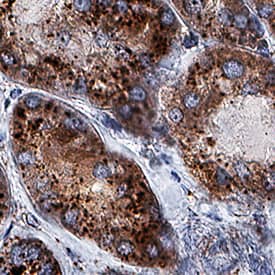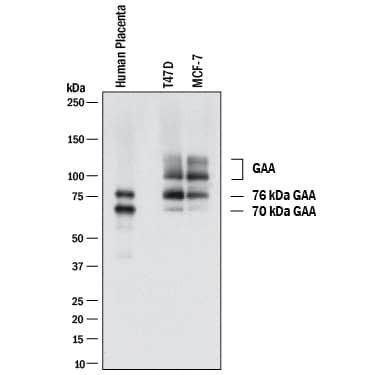Human Lysosomal alpha-Glucosidase Antibody
R&D Systems, part of Bio-Techne | Catalog # MAB8329
Recombinant Monoclonal Antibody.

Key Product Details
Species Reactivity
Human
Applications
Immunohistochemistry, Western Blot
Label
Unconjugated
Antibody Source
Recombinant Monoclonal Rabbit IgG Clone # 2489C
Product Specifications
Immunogen
Human embryonic kidney cell, HEK293-derived human Lysosomal alpha-Glucosidase protein
Ala70-Cys952
Accession # P10253
Ala70-Cys952
Accession # P10253
Specificity
Detects human Lysosomal alpha-Glucosidase protein in direct ELISAs.
Clonality
Monoclonal
Host
Rabbit
Isotype
IgG
Scientific Data Images for Human Lysosomal alpha-Glucosidase Antibody
Detection of Human Lysosomal alpha‑Glucosidase by Western Blot.
Western blot shows lysates of human placenta tissue, T47D human breast cancer cell line, and MCF-7 human breast cancer cell line. PVDF membrane was probed with 1 µg/mL of Rabbit Anti-Human Lysosomal a-Glucosidase Monoclonal Antibody (Catalog # MAB8329) followed by HRP-conjugated Anti-Rabbit IgG Secondary Antibody (Catalog # HAF008). Specific bands were detected for Lysosomal a-Glucosidase at approximately 72 kDa, 75 kDa, and 105 kDa (as indicated). This experiment was conducted under reducing conditions and using Immunoblot Buffer Group 1.Lysosomal alpha-Glucosidase in Human Kidney.
Lysosomal a-Glucosidase was detected in immersion fixed paraffin-embedded sections of human kidney using Rabbit Anti-Human Lysosomal a-Glucosidase Monoclonal Antibody (Catalog # MAB8329) at 3 µg/mL for 1 hour at room temperature followed by incubation with the Anti-Rabbit IgG VisUCyte™ HRP Polymer Antibody (Catalog # VC003). Before incubation with the primary antibody, tissue was subjected to heat-induced epitope retrieval using Antigen Retrieval Reagent-Basic (Catalog # CTS013). Tissue was stained using DAB (brown) and counterstained with hematoxylin (blue). Specific staining was localized to cytoplasm in convoluted tubules. View our protocol for IHC Staining with VisUCyte HRP Polymer Detection Reagents.Applications for Human Lysosomal alpha-Glucosidase Antibody
Application
Recommended Usage
Immunohistochemistry
3-25 µg/mL
Sample: Immersion fixed paraffin-embedded sections of human kidney tissue
Sample: Immersion fixed paraffin-embedded sections of human kidney tissue
Western Blot
1 µg/mL
Sample: Human placenta tissue, T47D human breast cancer cell line, and MCF‑7 human breast cancer cell line
Sample: Human placenta tissue, T47D human breast cancer cell line, and MCF‑7 human breast cancer cell line
Reviewed Applications
Read 1 review rated 5 using MAB8329 in the following applications:
Formulation, Preparation, and Storage
Purification
Protein A or G purified from cell culture supernatant
Reconstitution
Reconstitute at 0.5 mg/mL in sterile PBS. For liquid material, refer to CoA for concentration.
Formulation
Lyophilized from a 0.2 μm filtered solution in PBS with Trehalose. *Small pack size (SP) is supplied either lyophilized or as a 0.2 µm filtered solution in PBS.
Shipping
Lyophilized product is shipped at ambient temperature. Liquid small pack size (-SP) is shipped with polar packs. Upon receipt, store immediately at the temperature recommended below.
Stability & Storage
Use a manual defrost freezer and avoid repeated freeze-thaw cycles.
- 12 months from date of receipt, -20 to -70 °C as supplied.
- 1 month, 2 to 8 °C under sterile conditions after reconstitution.
- 6 months, -20 to -70 °C under sterile conditions after reconstitution.
Background: Lysosomal alpha-Glucosidase
References
- Hoefsloot L.H. et al. (1988) EMBO J. 7:1697.
- Wan, L. et al. (2008) J. Neurol. 255:831.
- Fukuda, T. et al. (2007) Curr. Neurol. Neurosci. Rep. 7:71.
- Van Gelder, C.M. et al. (2014) J Inherit Metab Dis. In press.
- Toscano, A. and Schoser, B. (2013) J. Neurol. 260:951.
Long Name
Glucosidase, Alpha; Acid
Alternate Names
Acid alpha-Glucosidase, Acid Maltase, GAA, LYAG, Lysosomal alphaGlucosidase
Gene Symbol
GAA
UniProt
Additional Lysosomal alpha-Glucosidase Products
Product Documents for Human Lysosomal alpha-Glucosidase Antibody
Product Specific Notices for Human Lysosomal alpha-Glucosidase Antibody
For research use only
